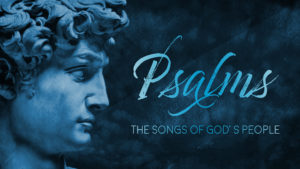When you arrive at 1 Chronicles 16:7 you discover you’ve changed genres. We move out of narrative and into Hebrew poetry/psalms. We worship by allowing this song to guide our worship in church and in life. That means at least 7 aspects of worship, plus the reason why God deserves our worship.
So, as you read through the Psalm you can teach that worship involves:
- Giving thanks (vv. 8a, 34a)
- Asking for help (vv. 8b, 11, 35)
- Singing His praises (vv. 9a, b, 10, 23a, 28-29a, 36). Let me pause for a moment and point out in v. 10 that God commands us to be happy. I always love that. He says, “I know life is often hard, but I’m good and I am putting together the pieces of My broken world. You are a part of that restoration while you wait for Me to finish the job.” Your congregants will appreciate the honesty, the balance of brokenness and wholeness they experience.
- Witnessing in the world (vv. 8c, 9c, 23b-24). I must admit: I didn’t see that one coming. But, as you can see in the Psalm, corporate worship involves instruction to tell the Story. If I was a techie, I’d write: Tweet This: Every worship service is a commissioning service. But, I’m not…
- Remembering His promises (vv. 12-22)
- Bringing an offering (v. 29b). We’ll see more on this in the last chapter of 1 Chronicles.
- Becoming holy (v. 29c). It can’t get much clearer: “Worship the Lord in the splendor of holiness…” It’s a great time to remind everyone that we can’t worship God and rebel against Him at the same time.
Finally, vv. 25-27, 30-33, 34b, c provide the reason why God deserves our worship: “For great is the Lord…” (v. 25).
If you’re interested in making a Christo-centric application (more on the difference between Christ-centered interpretation and application later maybe), you can move from v. 15-16 (“Remember his covenant forever…”) to the New Covenant in His blood (cf. Luke 22:20).
Preach the Psalms in Chronicles, or the Psalms in Psalms for that matter, so God receives glory in the Church and in Christ Jesus (Ephesians 3:21).
Randal



Reading point 4, about witnessing in the world, I was pretty sure that this psalm might be a covenantal psalm. And then, at the very end of your article, under your Christo-centric application–bam! There it is! Beautiful! You got me reading the entire psalm now, and once again, tempted me to preach another book. 🙂
But I have a question. Is this the original psalm, which was afterwards expanded into the three psalms in the Book of the Psalms (apparently parts of 105, 96 & 106), or is it Ezra’s digested compilation of the three? I doubt there’s a way to know for sure, but I’m curious about your thoughts. I know it doesn’t really matter in the overall scheme of things, but I feel like it does, as I would be more inclined to prefer the former of the two options. (To me, it makes more sense that Ezra would go to the original sources for everything he wrote down, as we see with the histories, than it would be for him to put words into somebody’s mouth–but under Holy Spirit inspiration–I suppose one could ask if it matters…)
I know it’s probably a dumb question, but the covenantal aspect, especially in light of the next chapter, seems integral to this question. It’s as if David, by “swearing allegiance” to the Abrahamic covenant, is given his own extension or expansion or specific role in fulfilling it. (whereas Saul, by ignoring the Covenant, as expressed in the Law, was rejected) So, if it were written in after the fact by Ezra, it seems to me to lose some of its oomph. 🙂 But maybe I’m just raving here…
As always, thanks so much for your post. You always give me food for thought, and satisfying food at that. 😉
It’s always good to hear from you. Thank you, again, for not only replying, but for adding substance to the short posts. First, fight the temptation to preach through 1 Chronicles! (*smile*) It’s been challenging and rewarding. Second, the Psalm according to Chronicles makes some slight changes in wording from the Psalms in Psalms. It appears the Chronicler has made the Psalm a little more personal to his readers. So, I take it that the Chronicler has adopted the Psalm for his own purposes. Third, the impact or “oomph” of the worship/command of 1 Chronicles 16:15-18 (“Remember his covenant forever…the covenant that he made with Abraham…”) is felt by an audience that is post-exilic and having an opportunity to experience the blessing of the Davidic Kingdom again…if they follow David’s lead in worship. As you point out, God will extend His promise and command (cf. 1 Chronicles 16:15b) in the next chapter as it relates to David and Solomon. The Chronicler is urging the post-exilic population to enter worship again so they can receive the favor of God just like David’s citizens did. Hope that helps some. May God continue to show Himself strong in your life and work.
Randal